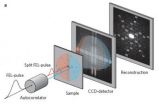(Press-News.org) Most babies can reach out for and eat finger food by six to eight months, according to a study in the January issue of Maternal and Child Nutrition.
However baby-led weaning - which advocates babies feeding themselves solid foods, rather than being spoon fed purees - could lead to nutritional problems for the small number of children who develop later than average.
That is why UK researchers - led by child health specialist Professor Charlotte M Wright from the University of Glasgow, Scotland - recommend combining self-feeding with solid finger food with traditional spoon feeding.
The research team used data from the Gateshead Millennium Study in north-east England, which provided information on when 602 children first reached out for food and other developments such as walking unaided and meaningful speech. Food diaries provided further information on 447 children, documenting the first five occasions they reached out for food.
By six months, 56 per cent of the babies were reaching out for food and 40 per cent were eating it – these figures had risen to 94 per cent and 90 per cent at eight months. After one year, only one baby covered by the study was not eating finger food.
"We also found clear parallels between the age at which babies reached out for food, walked unaided and spoke meaningful words" says Professor Wright from the University's Paediatric, Epidemiology and Community Health Unit.
"However, this does not suggest that providing babies with finger food at an early stage influences the speed at which they reach other key development milestones. It merely demonstrates that some babies develop a range of new skills earlier, or later, than others."
"There has always been a lot of debate about when babies should be weaned onto solids and the World Health Organization currently suggests six months" says Professor Wright. "The debate has now moved on to how babies should be weaned and, while some experts advocate babies being spoon-fed pureed solids, others support the baby-weaning approach, with babies being offered solid finger foods and encouraged to feed themselves from the outset.
"Baby-led weaning has already proved popular with parents, but there has been little formal research into its benefits and disadvantages."
Other key findings of the study included:
Infants who had reached out for food at six months were more likely to be walking unaided at one year than those who had not (54 per cent of the 602 children, versus 38 per cent).
They were also more likely to be speaking meaningfully at one year. For example, 68 per cent of the children who reached out for finger foods between four and five months were speaking, compared with 43 per cent of those who reached out at seven to eight months.
The most common finger foods were bread, rusks or biscuits but by the fifth occasion, 20 per cent were eating fruit or vegetables. Only two per cent were eating meat with their fingers and five per cent were eating confectionery.
40 per cent of the children covered by the food diaries had eaten finger food by six months and 90 per cent by eight months. The average age at which children ate their first finger food was 6.35 months.
By eight months, just over 90 per cent of the infants were having daily finger foods, but 35 per cent of parents still felt that their children needed to be fully fed at meal times. This suggests that parents didn't make finger food an integral part of meals or regard them as particularly important.
"Our findings suggest that baby-led weaning may be feasible for most infants, but could lead to nutritional problems for the small number of children - six per cent in our study - who develop more slowly" says Professor Wright. "We feel that it is more realistic to encourage infants to self-feed with solid finger food during family meals, but also give them spoon fed purees."
###
Notes to editors
Is baby-led weaning feasible? When do babies first reach out for and eat finger foods? Wright et al. Maternal & Child Nutrition. 7, pp 27-33. (January 2011). DOI: 10.1111/j.1740-8709.2010.00274.x
Maternal & Child Nutrition addresses fundamental aspects of nutrition as well as new initiatives, latest research and innovation in all aspects of practice and policy that impinge on nutrition and its outcomes in women and their children, both in early and later life. Its scope includes pre-conceptual, antenatal and postnatal maternal nutrition, women's nutrition throughout their reproductive years, and fetal, neonatal, infant, child and adolescent nutrition and their effects throughout life. http://onlinelibrary.wiley.com/doi/10.1111/mcn.2011.7.issue-1/issuetoc
Wiley-Blackwell is the international scientific, technical, medical, and scholarly publishing business of John Wiley & Sons, with strengths in every major academic and professional field and partnerships with many of the world's leading societies. Wiley-Blackwell publishes nearly 1,500 peer-reviewed journals and 1,500+ new books annually in print and online, as well as databases, major reference works and laboratory protocols. For more information, please visit http://www.wileyblackwell.com/ or our new online platform, Wiley Online Library (http://www.wileyonlinelibrary.com/), one of the world's most extensive multidisciplinary collections of online resources, covering life, health, social and physical sciences, and humanities.
Baby-led weaning is feasible but could cause nutritional problems for minority of infants
2011-01-13
ELSE PRESS RELEASES FROM THIS DATE:
Study sheds new light on river blindness parasite
2011-01-13
The team found that a bacterium inside the worm acts as a 'disguise' for the parasite, resulting in the immune system reacting to it in an ineffective way. The bacteria protect the worm from the body's natural defences, but once the bacteria are removed with antibiotics, the immune system responds appropriately, releasing cells, called eosinophils, that kill the worm.
Antibiotics are successful against the parasite, but the long treatment regime means that it has limited use across whole communities. These new findings suggest that if medics could prime the immune ...
Sleep mode: The energy cost of sleep deprivation
2011-01-13
The findings show that missing a night of sleep burns roughly 135 calories, the equivalent of two slices of bread or a 225 ml glass of semi-skimmed milk. In terms of physical exertion, this amounts to walking just under two miles. On the flip side, eight hours of sleep saved the same approximate amount of energy.
'While the amount of energy saved during sleep may seem small, it was actually more than we expected,' says Professor Kenneth Wright, lead author of the study and Director of Colorado University's Sleep and Chronobiology Laboratory. 'If one considers the amount ...
The 'Spaser' heats up laser technology
2011-01-13
Lasers have revolutionized the communications and medical industries. They focus light to zap tumors and send digital TV signals and telephone communications around the world.
But the physical length of an ordinary laser cannot be less than one half of the wavelength of its light, which limits its application in many industries. Now the Spaser, a new invention developed in part by Tel Aviv University, can be as small as needed to fuel nano-technologies of the future.
Prof. David Bergman of Tel Aviv University's Department of Physics and Astronomy developed and patented ...
Adrenaline receptor 'frozen in action' by VIB researchers
2011-01-13
Brussels - Adrenaline, the hormone that prepares our body to fight or flight, acts on a hyperdynamic receptor. This molecule switches so fast between several positions, that it was impossible to image it. Until now. Scientists, including Jan Steyaert of VIB and the Vrije Universiteit Brussel in Belgium, and colleagues from Stanford University in the US, have "frozen the molecule in action" using Xaperones™, tiny, stable antibodies developed by the Brussels scientists. The Xaperones™ bind like a key to a lock, holding the adrenaline receptor in one position -- the on position. ...
Origins of the pandemic: Study reveals lessons of H1N1
2011-01-13
As H1N1 'Swine Flu' returns to the national headlines a new research paper reveals the key lessons about the origins of the 2009 pandemic. The paper, published today in BioEssays, reveals how the pandemic challenges the traditional understanding of 'antigenic shift' , given that the virus emerged from an existing influenza subtype.
"H1N1 emerged in February 2009 in Mexico and swept around the globe within 6 months." said Professor Hans Dieter Klenk from Philipps-Universität Marburg. "The conventional ideal is that pandemics are fuelled by new strands which emerge in the ...
New approach to modeling power system aims for better monitoring and control of blackouts
2011-01-13
Major power outages are fairly infrequent, but when they happen they can result in billions of dollars in costs – and even contribute to fatalities. Now research from North Carolina State University has led to the development of an approach by which high-resolution power-system measurements, also referred to as Synchrophasors, can be efficiently used to develop reliable models of large power systems, which would help us keep an eye on their health.
Synchrophasors are real-time measurements of voltages and currents that provide a very high-resolution view of various complex ...
People neglect who they really are when predicting their own future happiness
2011-01-13
Humans are notoriously bad at predicting their future happiness. A new study published in Psychological Science, a journal of the Association for Psychological Science, suggests that part of the reason for these mispredictions lies in failing to recognize the key role played by one's own personality when determining future emotional reactions.
The new evidence comes from Jordi Quoidbach, a psychological scientist at the University of Liege, Belgium. Quoidbach and Elizabeth Dunn, his collaborator at the University of British Columbia, found that our natural sunny or negative ...
Fastest movie in the world recorded
2011-01-13
When we catch a cold, the immune system steps in to defend us. This is a well-known biological fact, but is difficult to observe directly. Processes at a molecular level are not only miniscule, they are often extremely fast, and therefore difficult to capture in action. Scientists at Helmholtz-Zentrum Berlin für Materialien und Energie (HZB) and the Technische Uni-versität Berlin (TUB) now present a method that takes us a good step towards producing a "molecular movie". They can record two pictures at such a short time interval that it will soon be possible to observe molecules ...
Sleep-disordered breathing comes at a heavy cost
2011-01-13
"Snoring, sleep apnoea, and obesity-related respiratory difficulties are fairly common disorders that affect a large proportion of the population," according to Poul Jennum, Professor of Clinical Neurophysiology at the Center for Healthy Ageing at the University of Copenhagen Faculty of Health Sciences. He is head of the Danish Centre for Sleep Medicine, Glostrup Hospital, which treats patients from all over the country.
"Previous studies show that these disorders seriously affect quality of life, and our new studies show that people who snore violently, and particularly ...
'Yo-yo' effect of slimming diets explained
2011-01-13
If you want to lose the kilos you've put on over Christmas, you may be interested in knowing that the hormones related to appetite play an important role in your likelihood of regaining weight after dieting. A new study confirms that people with the highest levels of leptin and lowest levels of ghrelin are more likely to put the centimetres they lost back on again.
Doctors often have to deal with patients who, after sticking to a slimming diet, have regained the kilos lost in just a short time – or weigh even more than they did before they started the diet. This is called ...

